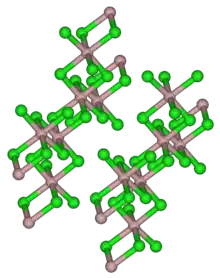Holmium(III) chloride
Holmium(III) chloride is the inorganic compound with the formula HoCl3. It is a common salt but is mainly used in research. It can be used to produce pure holmium.[2] It exhibits the same color-changing behavior seen in holmium oxide, being a yellow in natural lighting and a bright pink color in fluorescent lighting.
 | |
| Names | |
|---|---|
| Other names
Holmium trichloride Holmiumchlorid | |
| Identifiers | |
| |
| ECHA InfoCard | 100.030.339 |
PubChem CID |
|
| UNII | |
CompTox Dashboard (EPA) |
|
| Properties | |
| HoCl3 | |
| Molar mass | 271.289 g/mol |
| Appearance | yellow crystals hygroscopic |
| Density | 3.7 g/cm3 |
| Melting point | 720 °C (1,328 °F; 993 K)[1] |
| Boiling point | 1,500 °C (2,730 °F; 1,770 K) (decomposes) |
| dissolves | |
| Structure | |
| Monoclinic, mS16 | |
| C12/m1, No. 12 | |
| Related compounds | |
Other anions |
Holmium(III) oxide |
Other cations |
Dysprosium(III) chloride, Erbium(III) chloride |
Except where otherwise noted, data are given for materials in their standard state (at 25 °C [77 °F], 100 kPa).
Infobox references | |
Preparation
The most commonly used method to obtain holmium(III) chloride involves heating a mixture of holmium(III) oxide and ammonium chloride at 200-250 °C:[3]
- Ho2O3 + 6 NH4Cl → 2 HoCl3 + 6 NH3 + 2 H2O
The hexahydrate of holmium(III) chloride can be obtained by reaction between holmium and hydrochloric acid:[3]
- 2 Ho + 6 HCl → 2 HoCl3 + 3 H2
It can also be prepared by the direct reaction between holmium and chlorine:[4]
- 2 Ho + 3 Cl2 → 2 HoCl3
Properties
Holmium(III) chloride and its hexahydrate are light yellow solids in daylight that are soluble in water. The hexahydrate starts to release water of crystallization at 64 °C.[5] Holmium(III) chloride has a monoclinic crystal structure analogous to that of aluminum(III) chloride.[3] In the solid state it has the YCl3 layer structure.[6]
References
- Lide, David R., ed. (2006). CRC Handbook of Chemistry and Physics (87th ed.). Boca Raton, FL: CRC Press. ISBN 0-8493-0487-3.
- Emsley, John (2003). Nature's building blocks: an A-Z guide to the elements (Reprinted with corrections ed.). Oxford: Oxford Univ. Press. ISBN 978-0-19-850340-8.
- Handbook of Preparative Inorganic Chemistry, 2nd Ed. Edited by G. Brauer, Academic Press, 1963, NY.
- Webelements: Holmium
- Ans, Jan d'; Ans, Jan d' (1998). Elemente, anorganische Verbindungen und Materialien. Taschenbuch für Chemiker und Physiker / D'Ans (4., neubearb. u. rev. Aufl ed.). Ort nicht ermittelbar: Verlag nicht ermittelbar. ISBN 978-3-540-60035-0.
- Wells A.F. (1984) Structural Inorganic Chemistry 5th edition Oxford. ISBN 0-19-855370-6